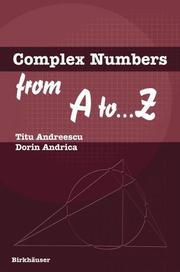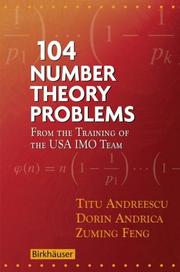| Listing 1 - 4 of 4 |
Sort by
|
Book
ISBN: 1280384166 9786613562081 0817646450 Year: 2009 Publisher: Boston, MA : Birkhäuser Boston : Imprint: Birkhäuser,
Abstract | Keywords | Export | Availability | Bookmark
 Loading...
Loading...Choose an application
- Reference Manager
- EndNote
- RefWorks (Direct export to RefWorks)
Number theory, an ongoing rich area of mathematical exploration, is noted for its theoretical depth, with connections and applications to other fields from representation theory, to physics, cryptography, and more. While the forefront of number theory is replete with sophisticated and famous open problems, at its foundation are basic, elementary ideas that can stimulate and challenge beginning students. This lively introductory text focuses on a problem-solving approach to the subject. Key features of Number Theory: Structures, Examples, and Problems: * A rigorous exposition starts with the natural numbers and the basics. * Important concepts are presented with an example, which may also emphasize an application. The exposition moves systematically and intuitively to uncover deeper properties. * Topics include divisibility, unique factorization, modular arithmetic and the Chinese Remainder Theorem, Diophantine equations, quadratic residues, binomial coefficients, Fermat and Mersenne primes and other special numbers, and special sequences. Sections on mathematical induction and the pigeonhole principle, as well as a discussion of other number systems are covered. * Unique exercises reinforce and motivate the reader, with selected solutions to some of the problems. * Glossary, bibliography, and comprehensive index round out the text. Written by distinguished research mathematicians and renowned teachers, this text is a clear, accessible introduction to the subject and a source of fascinating problems and puzzles, from advanced high school students to undergraduates, their instructors, and general readers at all levels.
Number theory --- Number theory. --- Number study --- Numbers, Theory of --- Algebra --- Mathematics. --- Algebra. --- Combinatorics. --- Number Theory. --- Mathematics, general. --- Combinatorics --- Mathematical analysis --- Mathematics --- Math --- Science --- Zahlentheorie. --- Combinatorial analysis.

ISBN: 0817643265 0817644490 Year: 2005 Publisher: Boston, MA : Birkhäuser Boston : Imprint: Birkhäuser,
Abstract | Keywords | Export | Availability | Bookmark
 Loading...
Loading...Choose an application
- Reference Manager
- EndNote
- RefWorks (Direct export to RefWorks)
It is impossible to imagine modern mathematics without complex numbers. Complex Numbers from A to . . . Z introduces the reader to this fascinating subject that, from the time of L. Euler, has become one of the most utilized ideas in mathematics. The exposition concentrates on key concepts and then elementary results concerning these numbers. The reader learns how complex numbers can be used to solve algebraic equations and to understand the geometric interpretation of complex numbers and the operations involving them. The theoretical parts of the book are augmented with rich exercises and problems at various levels of difficulty. A special feature of the book is the last chapter, a selection of outstanding Olympiad and other important mathematical contest problems solved by employing the methods already presented. The book reflects the unique experience of the authors. It distills a vast mathematical literature, most of which is unknown to the western public, and captures the essence of an abundant problem culture. The target audience includes undergraduates, high school students and their teachers, mathematical contestants (such as those training for Olympiads or the W. L. Putnam Mathematical Competition) and their coaches, as well as anyone interested in essential mathematics.
Numbers, Complex. --- Complex numbers --- Imaginary quantities --- Quantities, Imaginary --- Mathematics. --- Algebra. --- Algebraic geometry. --- Geometry. --- Number theory. --- Number Theory. --- Algebraic Geometry. --- Numbers, Complex --- 511.147 --- 511.147 Complex numbers. Imaginaries --- Complex numbers. Imaginaries --- Algebra, Universal --- Quaternions --- Vector analysis --- Geometry, algebraic. --- Mathematics --- Euclid's Elements --- Algebraic geometry --- Geometry --- Mathematical analysis --- Number study --- Numbers, Theory of --- Algebra --- Geometry, Algebraic.

ISBN: 0817645616 0817645276 Year: 2007 Publisher: Boston, MA : Birkhäuser Boston : Imprint: Birkhäuser,
Abstract | Keywords | Export | Availability | Bookmark
 Loading...
Loading...Choose an application
- Reference Manager
- EndNote
- RefWorks (Direct export to RefWorks)
This challenging problem book by renowned US Olympiad coaches, mathematics teachers, and researchers develops a multitude of problem-solving skills needed to excel in mathematical contests and research in number theory. Offering inspiration and intellectual delight, the problems throughout the book encourage students to express their ideas, conjectures, and conclusions in writing. Applying specific techniques and strategies, readers will acquire a solid understanding of the fundamental concepts and ideas of number theory. Key features: * Contains problems developed for various mathematical contests, including the International Mathematical Olympiad (IMO) * Builds a bridge between ordinary high school examples and exercises in number theory and more sophisticated, intricate and abstract concepts and problems * Begins by familiarizing students with typical examples that illustrate central themes, followed by numerous carefully selected problems and extensive discussions of their solutions * Combines unconventional and essay-type examples, exercises and problems, many presented in an original fashion * Engages students in creative thinking and stimulates them to express their comprehension and mastery of the material beyond the classroom 104 Number Theory Problems is a valuable resource for advanced high school students, undergraduates, instructors, and mathematics coaches preparing to participate in mathematical contests and those contemplating future research in number theory and its related areas.
Number theory --- Number study --- Numbers, Theory of --- Algebra --- Number theory. --- Sequences (Mathematics). --- Logic, Symbolic and mathematical. --- Number Theory. --- Sequences, Series, Summability. --- Mathematical Logic and Foundations. --- Mathematical sequences --- Numerical sequences --- Mathematics --- Algebra of logic --- Logic, Universal --- Mathematical logic --- Symbolic and mathematical logic --- Symbolic logic --- Algebra, Abstract --- Metamathematics --- Set theory --- Syllogism --- Mathematical logic. --- Sequences (Mathematics)
Book
ISBN: 0817645489 9786613568977 0817645497 1280391057 Year: 2010 Publisher: Boston, MA : Birkhäuser Boston : Imprint: Birkhäuser,
Abstract | Keywords | Export | Availability | Bookmark
 Loading...
Loading...Choose an application
- Reference Manager
- EndNote
- RefWorks (Direct export to RefWorks)
This problem-solving book is an introduction to the study of Diophantine equations, a class of equations in which only integer solutions are allowed. The material is organized in two parts: Part I introduces the reader to elementary methods necessary in solving Diophantine equations, such as the decomposition method, inequalities, the parametric method, modular arithmetic, mathematical induction, Fermat's method of infinite descent, and the method of quadratic fields; Part II contains complete solutions to all exercises in Part I. The presentation features some classical Diophantine equations, including linear, Pythagorean, and some higher degree equations, as well as exponential Diophantine equations. Many of the selected exercises and problems are original or are presented with original solutions. An Introduction to Diophantine Equations: A Problem-Based Approach is intended for undergraduates, advanced high school students and teachers, mathematical contest participants — including Olympiad and Putnam competitors — as well as readers interested in essential mathematics. The work uniquely presents unconventional and non-routine examples, ideas, and techniques.
Diophantine analysis. --- Diophantine equations. --- Electronic books. -- local. --- Diophantine equations --- Mathematics --- Physical Sciences & Mathematics --- Algebra --- Indeterminate analysis --- Diophantic equations --- Equations, Diophantic --- Equations, Diophantine --- Equations, Indefinite --- Equations, Indeterminate --- Indefinite equations --- Indeterminate equations --- Mathematics. --- Algebra. --- Number theory. --- Number Theory. --- Number theory --- Forms, Quadratic --- Diophantine analysis --- Mathematical analysis --- Number study --- Numbers, Theory of
| Listing 1 - 4 of 4 |
Sort by
|

 Search
Search Feedback
Feedback About UniCat
About UniCat  Help
Help News
News